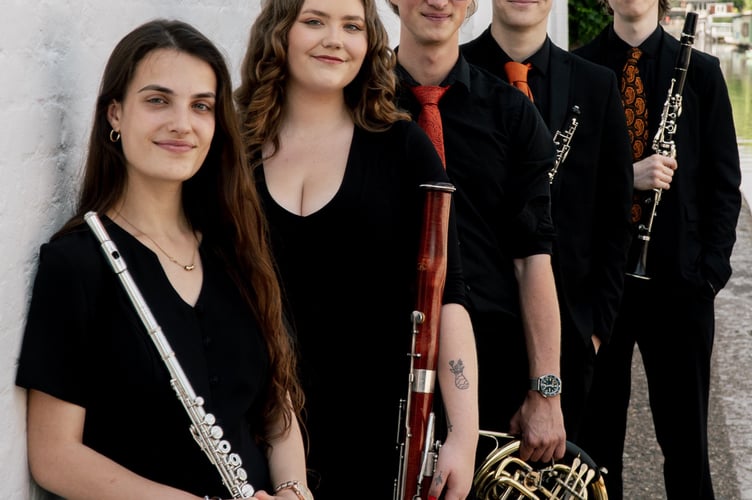Dolgellau Music Club's 40th season got off to a great start in Coleg Meirion-Dwyfor on Friday, 4 October.
Lumas Winds, a quintet whose virtuosity (individually) and musicality (as an ensemble) performed that night, making a tremendous impression on Ben Ridler.
He writes: “The programme chosen was adventurous, and unafraid to challenge listeners – no bad thing. A 'safe' start was given by horn player Benjamin Hartnell-Booth's skilful arrangement of Glinka's 1842 Overture to Ruslan and Lyudmila, whose energy and familiar melodies engaged immediately, together with the cleverly achieved symphonic effect.
“This contrasted well with the delightful Divertissement by Jean Françaix that followed, involving just oboe (Chris Vettraino), clarinet (Rennie Sutherland) and bassoon (Flo Plane); it was difficult to believe that such a joyful piece could have been written during the Nazi occupation of Paris.
“Another subtle piece of arranging followed, this time of Mozart's Andante in F major for mechanical organ, a piece as brimful as ever of that genius's melodic invention.

“So to a contemporary composition somewhat further from the 'comfort zone', Thea Musgrave's Wind Quintet of 1992, whose experimental style requires the instruments to play 'with the freedom of expression found in opera'. Variety of mood ('drammatico', 'elegiaco') between the four movements helped to maintain interest, and vivid textures drew listeners in more readily than they perhaps expected.
“A bright start opened the second half in the form of Jacques Ibert's Trois Pièces Brèves of 1930, whose animated charm reflects its theatrical origins.
“A duet in the middle piece was lyrically realised by Beth Stone's flute and the clarinet of Rennie Sutherland.
“The latter enjoyed introducing (all five were lively in presentation) Czech composer Pavel Haas' Wind Quintet Op.10 of 1929, which deploys a perky E flat clarinet (as well as piccolo) in its third-movement 'ballo eccentrico', full of catchy folk motifs. (Haas was one of Leos Janácek's best pupils.)
“There was poignancy in the second movement's prayer, 'misterioso e triste', knowing as we do that its creator would fall victim to the Holocaust in Auschwitz 15 years later.
“Perhaps the high point of the evening was another contemporary piece, William Mathias' Wind Quintet of 1992, which Lumas Winds have recently recorded for Champs Hill Records and clearly (as they told and showed the audience) relish performing. Though modernist, Mathias' music is never forbidding, and the Quintet's march, waltz, scherzo, elegy and dance swept listeners along.
“A final bluesy Red Clay and Mississipi Delta (2009) by Valerie Coleman made a perfect ending to a varied session of music-making, one that found its audience enthusing and wondering at the quality and richness of what they had experienced.”


-(1).png?width=209&height=140&crop=209:145,smart&quality=75)
